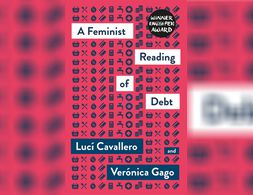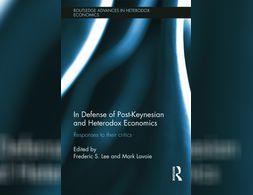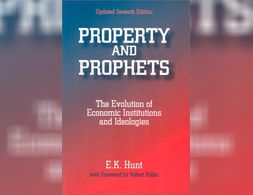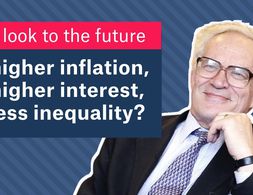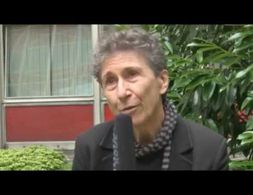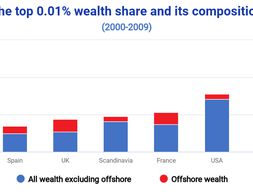1440 Ergebnisse
Green Growth has been increasingly discussed as a solution to the socio-ecological crisis. But can economic growth be sustainable at all?
What are the debates, feminist and otherwise, surrounding the phenomena of globalization? How does a gendered lens complicate our understandings of neoliberal globalization? How are particular labor regimes integral to global restructuring, and how are these gendered? What are the implications of global restructuring for bodies, identities, relations, and movements?
Mainstream economics was founded on many strong assumptions. Institutions and politics were treated as irrelevant, government as exogenous, social norms as epiphenomena. As an initial gambit this was fine. But as the horizons of economic inquiry have broadened, these assumptions have becomehindrances rather than aids.
In this sharp intervention, authors Lucí Cavallero and Verónica Gago defiantly develop a feminist understanding of debt, showing its impact on women and members of the LGBTQ+ community and examining the relationship between debt and social reproduction.
Noneconomists often think that economists' approach to race is almost exclusively one of laissez-faire. Racism, Liberalism, and Economics argues that economists' ideas are more complicated.
Professor Jennifer Clapp explains the dynamics of financialization of land and agricultural commodities in Subsaharan Africa. She points to the historical roots of accelerated land speculation and their connection to financial institutions, both generating and reinforcing the process of financialization of African land. Besides talking about roots and dynamics of speculation with land on financial markets, she puts the perspective of scholarly investigation onto the investor's side in discussing guidelines of responsible investment and regulation in the front instead of focussing on the receiving countries.
Quinn Slobodian a historian of modern Germany and international history analysis of current development in the Mont Pèlerin Society and therefore neo-liberalism. He sees neo-liberalist thinkers less as believers in the self-healing power of markets, but more as ordo-liberal Globalists who wanted to protect the markets from post-war politics and especially mass democracy. Their goal of global capitalism is still strong, however sceptics in the Mont Pèlerin Society are rising, which see international migration as a threat to Globalisation. Therefore, turning neo-liberal policies away from international institutions like the EU back towards the national states as new defenders of the markets as well as international trade and investments.
(A development which can be seen in the Friedrich A. von Hayek-Gesellschaft and especially in the "liberal" wing of the German rightwing populist party AfD)
Silvia Federici outlines the content of her book „Caliban and the Witch - Women, the Body and Primitive Accumulation“. Departing from a critique of the Marxist blindspot on reproductive labour, Federici aims at researching the historical process by which the exploitation of women and the construction of the unproductive housewife has been established. Federici points to the transition from the feudal to the capitalist mode of production and explains how the gender specific prosecution (witch hunt) was linked to necessity of control over bodies and the sexuality in the great transformation. Federici also presents arguments why this research is highly relevant for the analysis of women's situation in current capitalism.
In this video, Clara Mattei investigates the function of austerity in relation the stabilization of capitalism as a form of social order build around private property, wage labor and class relations. In order to develop this argument, she situates austerity in the history of World War 1 and its revolutionary aftermath. Zooming in on the politicization of the economy and the associated threat to class society that emerged in the period, she highlights how austerity was a „tool of reaction“ that was successful in curtailing demands for economic democracy and a society free from class oppression.
In this interview, the political activist, author and lecturer Dr. Vandana Shiva explains the linkage between ecology, feminism and economics along the lines of current effects and implications of the Corona-Crisis in India and around the world.
The documentary proceeds along the lines of Karl Marx' biography, inquiring into his workings as a journalist, social scientist, revolutionary and historian and his travels through Europe. In chronological order historical events, such as the 1848 revolution or the Paris Commune as well as concepts such as dialectics, the labour theory of value or the reform-revolution debate are revisited. The documentary is narrated by John Kenneth Galbraith and by an actor, who plays Marx and recites quotes from his writings.
This is a recording of an introductory course held at the 4th International Degrowth Conference for Ecological Sustainability and Social Equity in Leipzig in 2014. Federico Demaria from the French-Spanish organisation Research and Degrowth gives an introduction to degrowth. The presentation is based on the introduction to the book “Degrowth. A vocabulary for a new era.” and discusses definitions of degrowth, degrowth literature, debates, history and further research to be done.
Teaching feminist economics is a relatively new didactical project posing questions of content and methodology for instructors. The article proposes three possible topics with regard to the changing nature of the emergent research field: introducing feminist economics as a mode of questioning, showing its historicity and spectrum, and asking the question of a unifying paradigm.
In the course Sociology and Socialism, students engage with classical theories of socialism as well as their applications in a variety of historical and international contexts. Staunchly interdisciplinary, the course utilizes expertise in philosophy, history, economics, sociology, anthropology and political theory.
Over the last decade, the world's largest corporations - from The Coca Cola Company to Amazon, Apple to Unilever - have taken up the cause of combatting modern slavery. Yet, by most measures, across many sectors and regions, severe labour exploitation continues to soar. Corporate social responsibility is not working. Why?
Post-Keynesian and heterodox economics challenge the mainstream economics theories that dominate the teaching at universities and government economic policies. And it was these latter theories that helped to cause the great depression the United States and the rest of the world is in.
The current global financial system may not withstand the next global financial crisis. In order to promote the resilience and stability of our global financial system against future shocks and crises, a fundamental reconceptualisation of financial regulation is necessary. This reconceptualisation must begin with a deep understanding of how today's financial markets, regulatory initiatives and laws operate and interact at the global level.
Shadow banking became one of the main features of modern market based financial capitalism and financial globalisation. Daniel Gabor locates this development in a Super-Cycle framework and sketches out opportunities to launch a new cycle that is green and just through financial regulation and publicly organised sustainable finance.
In most economics classes we focus on the production and consumption of goods and services, but what happens to the product and its packaging after it’s consumed? Waste disposal is a crucial step in the production process and as the theme of this month’s World Environment Day is #BeatPlasticPollution, we use the example of plastic bottles.
The documentary recounts the history of the first World War and gives a biography of Lenin. The concept of imperialism is briefly explored and it is concluded that by the end of world war one the old certainties and old ruling alliances between aristocracy and traditional capitalists were broken up.
John K. Galbraith recounts episodes in the history of money such as the creation of the bank of Amsterdam, John Law's fraudulent Bank Royal, the inception of the Bank of England and of the Federal Reserve to illustrate concepts such as money creation by commercial banks, the bank rate, open market operations or the money supply in general. The emotions, myths and struggles surrounding money are addressed and explained in a clear and consistent manner.
Hunt (economics, U. of Utah) provides a concise history of the rise and triumph of capitalism, centering mainly on England until 1800 and the U.S. since 1800. He traces the evolution of some of the most significant institutions of capitalism, analyzes the recurring ideological defenses and the radical critiques of capitalism, and examines intellectual developments which were occurring at the same time.
The third edition of Political Economy: The Contest of Economic Ideas is a fully updated overview of the political economy and its connection with social concerns. This book investigates the main traditions of economic ideas and provides a 'big picture' overview of the analytical tools and value judgements associated with competing schools of economic thought.
In the interview, Robert Skidelsky discusses the emergence of political influence of a certain school of economic thought and how the success of an economic theory depends on the power relations in the society. He introduces the historical example of Keynesian economics and its replacement by liberal economic theory and policy in the aftermath of the Great Depression, and transfers this historical case to the dominant paradigm of austerity policies in the Europe as response to rising public debts caused by the Financial Crisis. He contrasts austerity policies with a Keynesian approach. Furthermore, he relates the targets of policy to the underlying power structures, for example when not the reduction of unemployment but the protection of financial capital is politically addressed.
This short video visualizes the destabilizing effects financial markets can have on food prices, based on a paper by Jayati Ghosh. It introduces and explains the idea of future contracts and how those are used to speculate with basic food stuffs. After establishing the concepts, the video sketches out how the increase in those practices resulted in a substantial rise and later collapse of food prices around 2008 with severe consequences for many developing countries and their people.
The Money View Symposium was hosted by YSI on 5-7 February, 2021. The Symposium showcased the work of scholars and practitioners that make use of the so-called Money View, ranging from economists to lawyers, politicians and social scientists at large. The symposium aims to illuminate the main tenets of the Money View and to demonstrate its juxtaposition to the mainstream.
"Why information grows" by Cesar Hidalgo and the atlas of economic complexity. César visits the RSA to present a new view of the relationship between the individual and collective knowledge, linking information theory, economics and biology...
In this class we will explore how globalization shapes and is shaped by gender norms with a particular focus on questions related to ‘work,’ mobility and well-being.
Silvia Federici illustrates the potential of the concept of the commons as way of resistance and reorganization of the society in times of social injustice and ecological crisis. Amongst others, she outlines the role of women in the commons movement.
Federici explains why she regards the theory of the tragedy of the commons as unfounded and why she considers Marx's concept of primitive accumulation as still appropriate to describe current events of deprivation, such as land grabbing.
This note, by Theresa Neef, Panayiotis Nicolaides, Lucas Chancel, Thomas Piketty, and Gabriel Zucman, provides data on wealth inequality in Russia and advocates for a European Asset Registry.
This course is intended to present some of the main ideas underlying the micro aspects of gender economics. The courses will tackle issues as fertility, marriage, women labor force participation, wage gap, gender inequality, violence against women and women empowerment within her household and within the society where she lives.
"Alexander Kravchuk is an economist and editor at Commons: Journal for Social Criticims, who has previously written about IMF conditions on loans to Ukraine. Jacobin’s David Broder asked him about the country’s economic situation and why debt cancellation is important if Ukrainians are to be able to shape their future." (quote from the interview)
Wir nutzen Cookies. Klicke auf "Akzeptieren" um uns dabei zu helfen, Exploring Economics immer besser zu machen!




